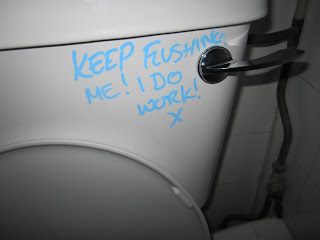This week I’m
staying with a well-travelled guy who is fluent in JavaScript and other cryptic
languages. Yesterday I went with him to The Brighton Farm, a networking group for freelancing new media types, and
beforehand I was warned by another guy: ”People get pissed and abuse each
other”.
It wasn’t that bad at all. Most people who go the Farm are serious about their work and have
received a lot of support when building up their careers as freelancers. I
overheard people asking for advice on everything from mobile apps to making promotional videos, and I went home with a couple of business cards in
my pocket, but if you’re not familiar with the English expression ”taking the
piss out of someone”, you might be in for a shock.
There were some people
who called each other ”crazy” and did things like folding a fiver so it looked
like ”the queen’s bum cheeeks”. I could give more examples, but they would be
too rude to put in print.
I’d prepared
myself to be bored. I’d thought the evening would be more like a meeting where
people discussed HTML in detail, than a fun social event where anything goes. I
chatted to a Chinese woman who had been to Sweden and found it strange that so
many dark films like The Girl with the Dragon tattoo and Let the
Right One In could could come out of a country that seemed so fairy-tale
like on the surface. I blamed the dark Swedish soul due to the long winters,
but against my will I found myself laughing along with the guys who made fun of
each other’s surnames and downing pints like there was no such thing as work
the next day. (Even though this netdrinking often leads to new job
opportunities).
When I asked my
host what he missed about England when he was away travelling he said, without
hesitation: ”The humour. Having a cup of tea or drink
with someone, having a laugh and taking the piss.’
According to Wikipedia “taking the piss out
of someone” is an expression meaning to mock, tease, ridicule, or scoff. I also
read up about the origin and there are several theories all urine-related, but
as mentioned above, I want to keep this blog reasonably family-friendly, so if
you’re interested you can read more here.
At the end of the night I when I took a
piss (literally), I was once again amused by the dysfunctional English toilets.
PÅ SVENSKA










